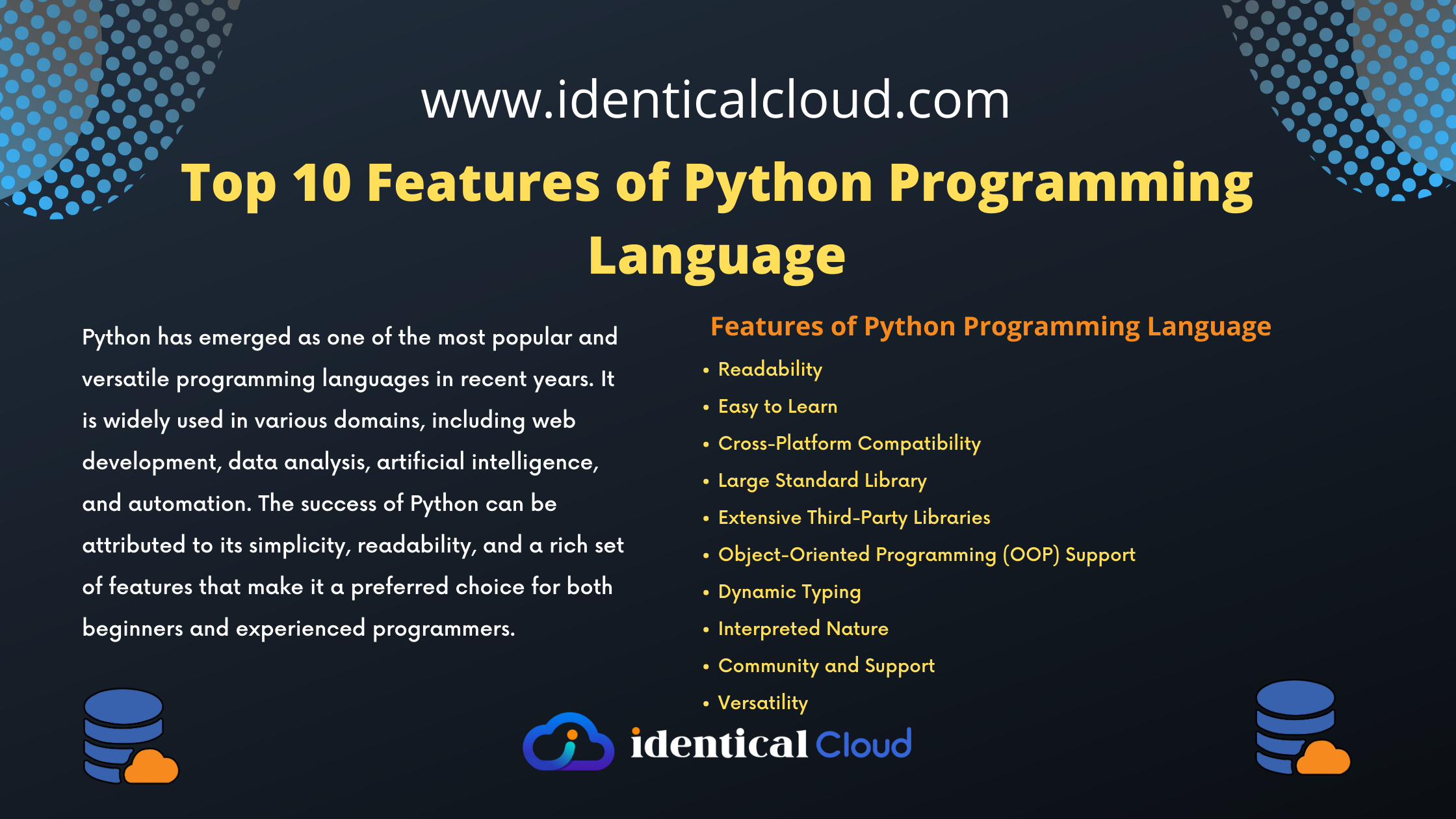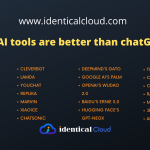
Top 10 Features of Python Programming Language
Top 10 Features of Python Programming Language
Python has emerged as one of the most popular and versatile programming languages in recent years. It is widely used in various domains, including web development, data analysis, artificial intelligence, and automation. The success of Python can be attributed to its simplicity, readability, and a rich set of features that make it a preferred choice for both beginners and experienced programmers.
In this blog, we will explore the top 10 features that make Python an exceptional programming language.
Readability
Python’s syntax is designed to be highly readable, with clean and straightforward code structures. Its use of indentation instead of braces makes it easier to understand the code’s logic and structure, fostering code consistency and reducing the chances of errors.
Easy to Learn
Python has a gentle learning curve, making it an excellent choice for beginners. Its simple and intuitive syntax allows new programmers to grasp the fundamentals quickly. The availability of extensive documentation and a supportive community further enhances the learning experience.
Cross-Platform Compatibility
Python is a cross-platform language, which means that code written in Python can run on different operating systems such as Windows, macOS, and Linux without any modifications. This flexibility allows developers to write code once and deploy it across multiple platforms.
Large Standard Library
Python comes bundled with a comprehensive standard library that offers a wide range of modules and functions for various tasks. It eliminates the need to write code from scratch for common functionalities, saving developers time and effort. Whether it’s handling file operations, network communication, or data manipulation, Python’s standard library has got you covered.
Extensive Third-Party Libraries
In addition to its standard library, Python boasts a vast ecosystem of third-party libraries and frameworks. Popular libraries like NumPy, Pandas, and TensorFlow provide powerful tools for scientific computing, data analysis, and machine learning. These libraries greatly extend Python’s capabilities, making it a go-to language for various domains and applications.
Object-Oriented Programming (OOP) Support
Python supports object-oriented programming, allowing developers to create reusable and modular code. OOP principles, such as encapsulation, inheritance, and polymorphism, enable developers to build complex applications while maintaining a clean and organized codebase.
Dynamic Typing
Python is dynamically typed, meaning that variables are not explicitly declared with a specific data type. This flexibility allows for more rapid development and code iteration, as variables can hold different types of data at different points in the program.
Interpreted Nature
Python is an interpreted language, which means that it does not require explicit compilation. This allows for quick prototyping and testing, as code changes can be immediately executed without the need for a lengthy compilation process. The interpreted nature of Python also makes it an excellent language for scripting and automation tasks.
Community and Support
Python has a vibrant and active community of developers who contribute to its growth and development. The Python community is known for its helpfulness and accessibility, providing numerous online resources, forums, and documentation. This support network makes it easy to find answers to questions, share knowledge, and collaborate on projects.
Versatility
Python’s versatility is one of its standout features. It can be used for a wide range of applications, from web development to scientific computing, data analysis, artificial intelligence, and more. Whether you are building a simple script or developing a complex application, Python provides the tools and frameworks necessary to get the job done efficiently.
These are just some of the top features of Python programming language. If you are looking for a powerful, versatile, and easy-to-learn language, then Python is a great choice.
Here are some additional benefits of using Python:
- Python is used by many large companies, such as Google, Facebook, and Netflix.
- Python is a popular language for data science and machine learning.
- Python is a great language for beginners, but it is also powerful enough for experienced developers.
- Python is a free and open source language, which means that it is accessible to everyone.
If you are interested in learning Python, there are many resources available online and in libraries. You can also find many Python tutorials and courses on YouTube.
Python’s popularity is not without reason. Its simplicity, readability, and an extensive set of features make it an incredibly powerful and versatile programming language. From its clean syntax and large standard library to its support for OOP and dynamic typing, Python offers a delightful programming experience for developers of all levels. Whether you are a beginner or an experienced programmer, Python is a language worth exploring and mastering.
So, if you’re looking for a language that combines ease of use, flexibility, and a vibrant community, Python is the way to go!








